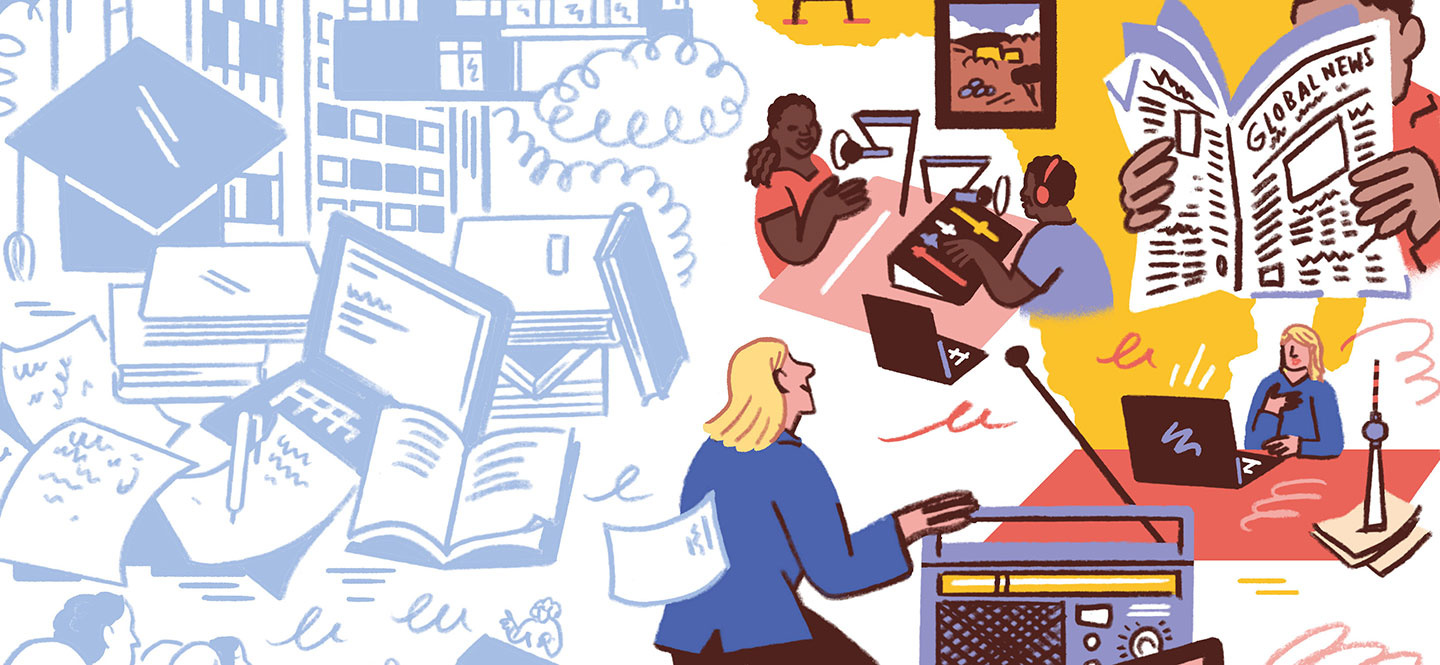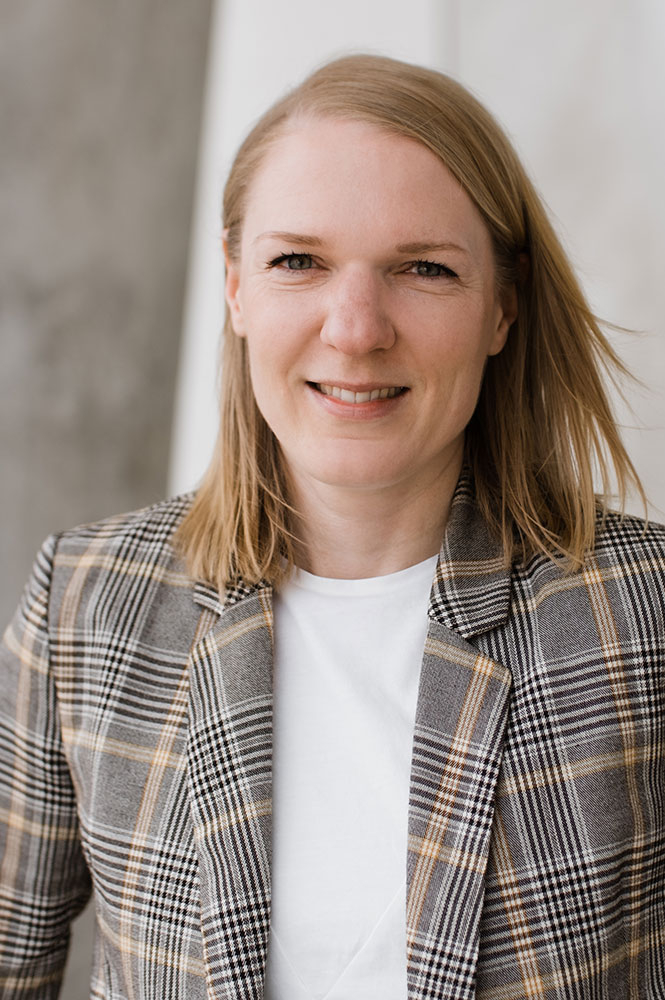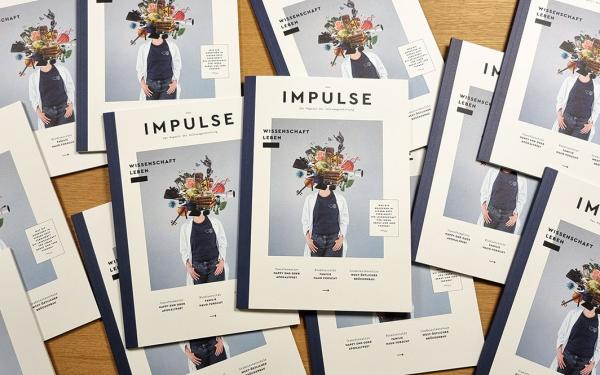Professorship? Not necessarily ...

Kati Szilágyi for VolkswagenStiftung
Ines Drefs is fascinated by research – and most of all by the topic of media development assistance. A new position at the interface of science and practice came just in time.
People born under the zodiac sign of Gemini, it is said, have an alert mind, are driven by curiosity, and can absorb stacks of information in a very short time. They are very sociable and have a knack for communication and networking – also in professional contexts. If you believe in the horoscopes published by lifestyle magazines, then "Gemini" are predestined for work in the media industry. They also change jobs more often to try out new things.
When you talk with Ines Drefs, born in 1984 under this zodiac sign, you cannot help thinking: That fits! The com-munication scienctistis amused: "Although I don't believe in astrology, I've always thought that what I've read in connection with my zodiac sign rather hits the mark.” Drefs enjoys talking about her work as a researcher, and specifically about her main focus – media development assistance in African and Asian countries. Her résumé, however, also contains stations beyond a classical academic career.
What is most important?
A professorship is still considered the crowning glory of a career following the doctorate, and anyone who wants to make a name for themselves in the German scientific community cannot avoid working towards it. Drefs, who grew up in the charming medieval town of Hannoversch Münden in Lower Saxony, sees things somewhat differently: "I'm a passionate researcher, and I have a doctorate – but a professorship was never really my primary goal. There are other exciting fields where you can work scientifically." Perhaps the fact that she was raised in a non-academic household plays a role in this. "My parents made a point of letting us kids decide for ourselves what suited us best," she says. The main thing was to be happy, she says. And not: The main thing is a career.
Ines Drefs is living proof that it is possible to pursue one's scientific ambitions outside of academia. She is a project manager in the "Research and Evaluation" department at "Deutsche Welle Akademie" in Berlin since October 2022. How can media around the world be supported in combating targeted disinformation and promoting democratization processes? Which dialogue formats are suitable for reaching the population especially in rural areas? Such questions and assessing the effectiveness of the measures developed – for example in community radio stations – are the focus of her work at the Deutsche Welle Academie, which is committed to promoting pluralism and freedom of expression in many countries around the world.
Enjoying exchange
"My colleagues and I develop, plan and evaluate studies that accompany projects," she explains. Drefs, for example, is currently responsible for developing and evaluating radio projects in Niger, West Africa. To this end, she maintains close relationships with the partner teams and local staff on the ground. It is this exchange of ideas and experience that she particularly enjoys. She regrets that she has not yet had the opportunity to meet the people responsible for the local radio stations in person: "That would be important, of course, to see on the ground how media development practitioners work in Niger. But it is quite dangerous to travel outside the capital to get to the projects. That's why contact has been limited to video meetings so far."
What she particularly appreciates about her practice-oriented work for Deutsche Welle Akademie? "Through my research, I can help improve media systems together with the actors on the ground. I have a fixed budget for this – which also covers cooperation with external research institutes, for example. I don't need to raise any additional third-party funds for this – which, of course, I would have to do as a university researcher. And the lengthy procedure involved with such applications would then possibly cost me valuable research time."
She herself was a journalist only for a short time, working as a freelancer for a newspaper in her northern German home region. And, after completing her bachelor's degree at the University of Erfurt, one of her academic training stages took her to the Danish School of Journalism in Aarhus. She studied in the international master's program ‘Journalism and Media within Globalization: The European Perspective.’ "Very soon I realized that for me personally it would be more worthwhile to do research on journalism and the conditions of doing journalism around the world." Her fellow students in Aarhus came from countries like El Salvador and Kenya; others from New Zealand and Canada. They shared insights on the situation facing the media in their home countries: about great media diversity, but also censorship and the threat to press freedom and democratic structures.

Drefs studied in Erfurt and Århus, among other places.
Detours along the way
Others would have focused on a career in science directly after completing their master's thesis. Drefs, on the other hand, took a couple of detours before deciding to pursue a doctorate: She completed a traineeship in science communication at what was then Jacobs University, and then worked in the social media team of a drugstore company in Hamburg. Out of interest and curiosity. But she quickly realized that community management on social media platforms was not something she wanted to do over the long term. So, Ines Drefs returned to academia, and to the media and democratization processes that were closer to her heart – in her doctoral thesis at the University of Hamburg as well as in an EU project at the Ruhr University in Bochum, and later as a postdoc at the Erich Brost Institute for International Journalism at the Technical University of Dortmund. There, she applied for the position of coordinator of the graduate school "MEDAS 21" (Global Media Assistance: Applied Research, Improved Practice in the 21 Century), where she was responsible for supervising and mentoring the doctoral students, organizing and moderating group events, and for cooperative projects with international partners on the ground.
As one of the Foundation’s postgraduate programs involving issues of professional practice, "MEDAS 21" was aimed at something that is also very important to Ines Drefs: showing young researchers alternative, practice-related fields of activity beyond academia at an early stage. " With my CV, I gave a good example for the doctoral students of the importance of also acquiring skills that may not count so much if you're aiming for a professorship, but which open up many other opportunities."
Living your priorities
Based on experiences made by friends from her student days, she knows what it means to work stringently toward the sole goal of becoming a professor. "This can be very fulfilling, but it also has its disadvantages. It entails living as a research assistant from one temporary postdoc employment contract to the next, combined with frequent moves and even commuting while your partner lives somewhere else."
In the end, only a few succeed in getting the professorship they want. Ines Drefs has no regrets about having chosen a different career path. She has been living in the countryside south of Hamburg with her husband for some time now and enjoys it very much, including the alternation between working from home and periods of presence in Berlin. Her current employment contract is also temporary – but as an optimistic Gemini with strong communication skills, she is convinced: "There will be further exciting tasks for me at DW Akademie."

